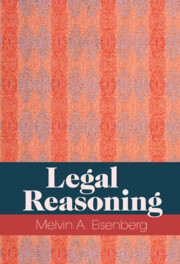Book contents
- Legal Reasoning
- Legal Reasoning
- Copyright page
- Dedication
- Contents
- Preface
- 1 A Brief Introduction to the Common Law
- 2 Rule-Based Legal Reasoning
- 3 Reasoning from Precedent and the Principle of Stare Decisis
- 4 How It Is Determined What Rule a Precedent Establishes
- 5 Reasoning from Authoritative Although Not Legally Binding Rules
- 6 The Role of Moral, Policy, and Empirical Propositions in Legal Reasoning, and the Judicial Adoption of New Legal Rules Based on Social Propositions
- 7 Legal Rules, Principles, and Standards
- 8 The Malleability of Common Law Rules
- 9 Hiving Off New Legal Rules from Established Legal Rules, Creating Exceptions to Established Rules, and Distinguishing
- 10 Analogy-Based Legal Reasoning
- 11 The Roles of Logic, Deduction, and Good Judgment in Legal Reasoning
- 12 Reasoning from Hypotheticals
- 13 Overruling
- Acknowledgments
- Index
10 - Analogy-Based Legal Reasoning
Published online by Cambridge University Press: 22 September 2022
- Legal Reasoning
- Legal Reasoning
- Copyright page
- Dedication
- Contents
- Preface
- 1 A Brief Introduction to the Common Law
- 2 Rule-Based Legal Reasoning
- 3 Reasoning from Precedent and the Principle of Stare Decisis
- 4 How It Is Determined What Rule a Precedent Establishes
- 5 Reasoning from Authoritative Although Not Legally Binding Rules
- 6 The Role of Moral, Policy, and Empirical Propositions in Legal Reasoning, and the Judicial Adoption of New Legal Rules Based on Social Propositions
- 7 Legal Rules, Principles, and Standards
- 8 The Malleability of Common Law Rules
- 9 Hiving Off New Legal Rules from Established Legal Rules, Creating Exceptions to Established Rules, and Distinguishing
- 10 Analogy-Based Legal Reasoning
- 11 The Roles of Logic, Deduction, and Good Judgment in Legal Reasoning
- 12 Reasoning from Hypotheticals
- 13 Overruling
- Acknowledgments
- Index
Summary
Reasoning by analogy may be rule-based or fact-based. Rule-based analogical reasoning involves two steps. The first step is to identify an existing rule that is proposed to be applied to the case to be decided because it is analogous to that case – the given rule. The second step is to determine whether as a matter of social propositions the given rule cannot be distinguished from the case to be decided and therefore should be applied to that case by analogy. Common law courts seldom reason by analogy because a court would never reason by analogy if the case before it is governed by a rule and the common law is thick with rules. Rule-based analogy is a weak form of legal reasoning because often a court must pick from competing analogies so that rule-based analogical reasoning is unpredictable. Fact-based analogical reasoning is based on a factual similarity between the case to be decided and a prior case that is proposed as an analogy. It is weak for the same reason.
- Type
- Chapter
- Information
- Legal Reasoning , pp. 82 - 85Publisher: Cambridge University PressPrint publication year: 2022



